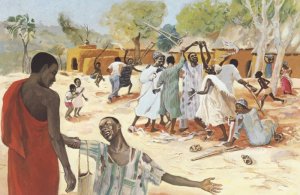“Our Mighty Fortress”

Psalm 46:1-7 (46:7) – October 30, 2022
Here we are at Reformation Sunday, the week of the year when we remember Martin Luther posting his list of grievances against the church establishment of the Catholic Church, more than 500 years ago in 1517. These 95 grievances against the Church sparked a movement of protest that was felt around the world. And thus, the Protestant Church was born.
Our psalm reading today was Martin Luther’s favorite psalm. And, what a marvelous psalm to choose! Martin took this psalm to heart, for a whole host of reasons! These were literal reasons, too. The Lord was indeed his fortress, helping him to stay safe through all danger.
The official Catholic Church hierarchy certainly had it in for Martin Luther! After defending himself against strident criticism from scholars and theologians, and legal challenges for years, the official verdict registered by the Catholic Church was not in Luther’s favor. He broke with Rome in 1521. Because he would not recant his views on God, salvation by faith, and the Bible, Luther was officially on the run from the Catholic establishment.
I think of Martin on the run, like young David, after Samuel anointed him king. Martin Luther needed the Lord to be a strong and secure refuge for him, what with all the military and operational might of the Catholic Church coming after him! Looking at the first verses, “God as a Fortress against the threats of nature (verses 1-3). The dominant theme of the psalm is trust in God, first sounded in verse 1, “God is our refuge and strength.” [1] A mighty fortress indeed!
This brought me to thinking, how do you and I trust? Do we – do you trust God to be a secure protection for us and our families? If not, why not? Just like King David, we can see time after time where people from the Bible – both the Hebrew Scriptures and the New Testament – trusted in God to be their refuge and strong fortress, as Martin wrote in the hymn we sang today.
We also remember Father Martin Luther – for he was a Catholic priest – as a sincere, devout follower of Jesus Christ. He thought long and hard about sin and confession, faith and grace. He thought a lot about God’s Word, and eventually translated the whole Bible – both Old and New Testaments – into German, the common tongue of his day and area of Germany. And, thank God that Martin was not only a theologian, but a skilled writer, translator, preacher and musician, too.
The Catholic Church hierarchy did not approve of the Bible translated into the common tongue, which was one of the reasons Martin was on the run. As we examine Psalm 46, one big feature of this psalm is the word “help.” “’Help’ has a more active sense, identifying God as one who takes action to assist those in trouble. Verses 2 and 3 indicate that God’s people need not fear the worst that nature can hurl at them, whether it be earthquakes or floods. Because no matter what, God will be with them.” [2]
Like Martin Luther on the run in parts of Germany, like King David in the wilderness of Israel, God can be our help and refuge, too. Let’s be clear: this psalm is not talking pie-in-the-sky, or looking at the world through rose-colored glasses. This psalm is clear and realistic. It does not promise “we as God’s people will be free from the ravages of nature or of war or of individual suffering. But they do promise that we will not have to go through these things alone. ‘The LORD of hosts is with us … ‘” [3]
This precious hymn written by Luther was not only a refuge from earthly disasters, but is also personal in nature. Rev. Janet Hunt, a Lutheran minister, mentions that she hears it “as much more personal now, knowing as we do that ‘the old satanic foe’ threatened him with the sorts of ‘woes’ one could only begin to understand if one has been there. The heart-wrenching, life altering death of a child, to name but one. The days and nights of struggling to hold on to faith when the Church which had borne the faith to him no longer lived up to its promises. The fear which must have possessed Luther as his very life was threatened.” [4]
Sure, with everything going on in the world today, we also have reason to be scared half to death! Yet, we have “a God who has been time-tested and, over and over again, can be trusted upon to keep you secure in your time of trouble. Either way – and in all times and circumstances – we have a God who has got us covered. That is what Psalm 46 declares. And that is what Luther wanted to proclaim in “A Mighty Fortress is Our God.”” [5]
Can we – you and I – loosen our tight grip on all we are clutching to our chests, knowing that God indeed holds everything? Including us?
This Reformation Sunday, Psalm 46 talks of a refuge, and a help in our great need.
Yes, God is indeed our refuge and strength, an ever-present help in trouble. That’s something to truly celebrate. Alleluia, amen.
(Suggestion: visit me at my other blogs: matterofprayer: A Year of Everyday Prayers. #PursuePEACE – and A Year of Being Kind . Thanks!
[1] https://www.workingpreacher.org/commentaries/revised-common-lectionary/reformation-day/commentary-on-psalm-46-12
[2] Ibid.
[3] Ibid.
[4] https://dancingwiththeword.com/being-still-letting-go/
[5] “A Mighty Fortress is our God” is not the only English translation of Luther’s “Ein Feste Burg.” Thomas Carlyle, the nineteenth century Scottish commentator, offered this version: “A safe stronghold our God is still, a trusty shield and weapon.” Carlyle’s contemporary, George MacDonald, rendered stanza one, verse one, in this way: “Our God he is a castle strong, a good mailcoat and weapon.”




